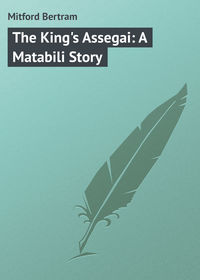Kitabı oku: «The King's Assegai: A Matabili Story», sayfa 5
Bir şeyler ters gitti, lütfen daha sonra tekrar deneyin
Türler ve etiketler
Yaş sınırı:
12+Litres'teki yayın tarihi:
23 mart 2017Hacim:
160 s. 1 illüstrasyonTelif hakkı:
Public Domain